________________
SEPTEMBER, 1877.] SOCIAL AND RELIGIOUS LIFE IN ANCIENT INDIA.
251
NOTES ON THE LAX OBSERVANCE OF CASTE RULES, AND OTHER FEATURES
OF SOCIAL AND RELIGIOUS LIFE, IN ANCIENT INDIA.
BY JOHN MUIR, D.C.L., LL.D., PH.D., EDINBURGH. The object of this paper is to show, by illus- or eating food received from any quarter : as a trations drawn chiefly from Manu and the clod of earth is dissolved when thrown into a Mahabharata, that the regulations defining the lake, all sin is sunk in the triple Veda (xi. 261, duties, relations, prerogatives, and functions of 263). With this may be compared the glori. the different Indian classes, as prescribed by fication of royalty in chapter vii. 5-8, where Manu and in some parts of the Mahábhárata, a king is said to be composed of eternal porwere not strictly respected or practised in an- tions of different gods, to surpass all beings in cient times in India; that the custom of poly- glory, to dazzle the eyes of all gazers, and to andry was not unknown, that liberal sentiments be a great deity in human form. were entertained regarding the religious posi- Elsewhere, however, it is said that neither tion of the lower classes, and that considerable the Vedas, nor liberality, nor sacrifices, nor freedom of speculation on theological topics was observances, nor austerities, can avail in the prevalent.
case of a man whose nature is corrupted (ii. 97); On this subject the remarks of Professor and that a Brahman who knows the gayatri Max Müller, in his Ancient Sansksit Literature, only, if his life is well regulated, is better than pp. 46ff., the article of M. Auguste Barth, of one who knows the three Vedas but whose life which a partial translation appeared in the is unregulated, who eats everything, and who Inulian Antiquary, vol. III., p. 329ff. (Nov. sells all commodities (ii. 118). An unlearned 1874), and my Original Sanskrit Texts, vol. I. p. Brâhman is compared to a wooden elephant or 366, note, and vol. III., pp. 292ff., may be re- a leathern deer (ii. 157). One who does not ferred to.
study the Veda, and employs himself in other Both in Manu and in the Mahabharata we pursuits, soon sinks with his descendants, even find very different ideas and statements about in this life, to the condition of a Sudra (ii. 168). the system of castes in earlier ages. I begin Such (ignorant) Brâhmaņs, as are mere ashes, with Manu. In some passages he appears to should not be entertained at sraddhas (presenrecord the Brahmans as infinitely superior to tations of oblations to gods and departed ancesall other men in virtue of their birth alone; tors) (iii. 97, 133, 142). Similarly, low and while in other places they are considered as infidel Brâhmaņs are declared unworthy of rederiving their eminence more from learning or ceiving honour at such celebrations (iii. 150, from moral goodness. In the following texts 167). The kind of Brahmaņg who should be their natural and inherent power and virtue, honoured on such occasions are described in and that springing from a knowledge of the verses iii. 128-131, 143, 145. A father who bas Vedas, are set forth -i. 93-95, 98-101;ix. 245, been instructed in the Veda by his son is to be 313-320; 2. 3; xi. 32, 85, 261, 263. The shunned (iü. 160), as is also a Brâhman leading Brâhman is said to be the chief of the crea- the life of a Sûdra (ii. 164). In answer to an tion, and lord of all beings (i. 93, 99); every- inquiry how death can prevail over Brahmass, thing in the world is his by right (i. 100). A Bhrigu declares that they are subject to death man of this class who has gone through the owing to their neglect of the study of the Veda, Veda is lord of the whole world (ix. 245). and inattention to propriety of conduct, &c. (v. Brahmans could destroy a king with all his 2-4). Those Brâhmaņs who accept gifts from host; they created fire, the ocean, and the Sudras for the offering of oblations to fire (agumoon, and could create new worlds and godshotra) are contemned as ministers of the base(ix. 313-15). Whether learned or not, and born (xi. 42.); and the performance of sacrieven when practising undesirable occupations, fices for Sudras is again reprehended (iii. 178f.). a Brâhman is a great divinity (ix. 317, 319). Kings, Kshatriyas, kings' domestic priests, and He is a divinity even to the gods (xi. 84). If men skilled in the war of words, are declared he retain in his memory the Rigveda, he would to belong to that middle class of beings who are incur no guilt by destroying the ihree worlds, under the influence of the principle of rajds or




